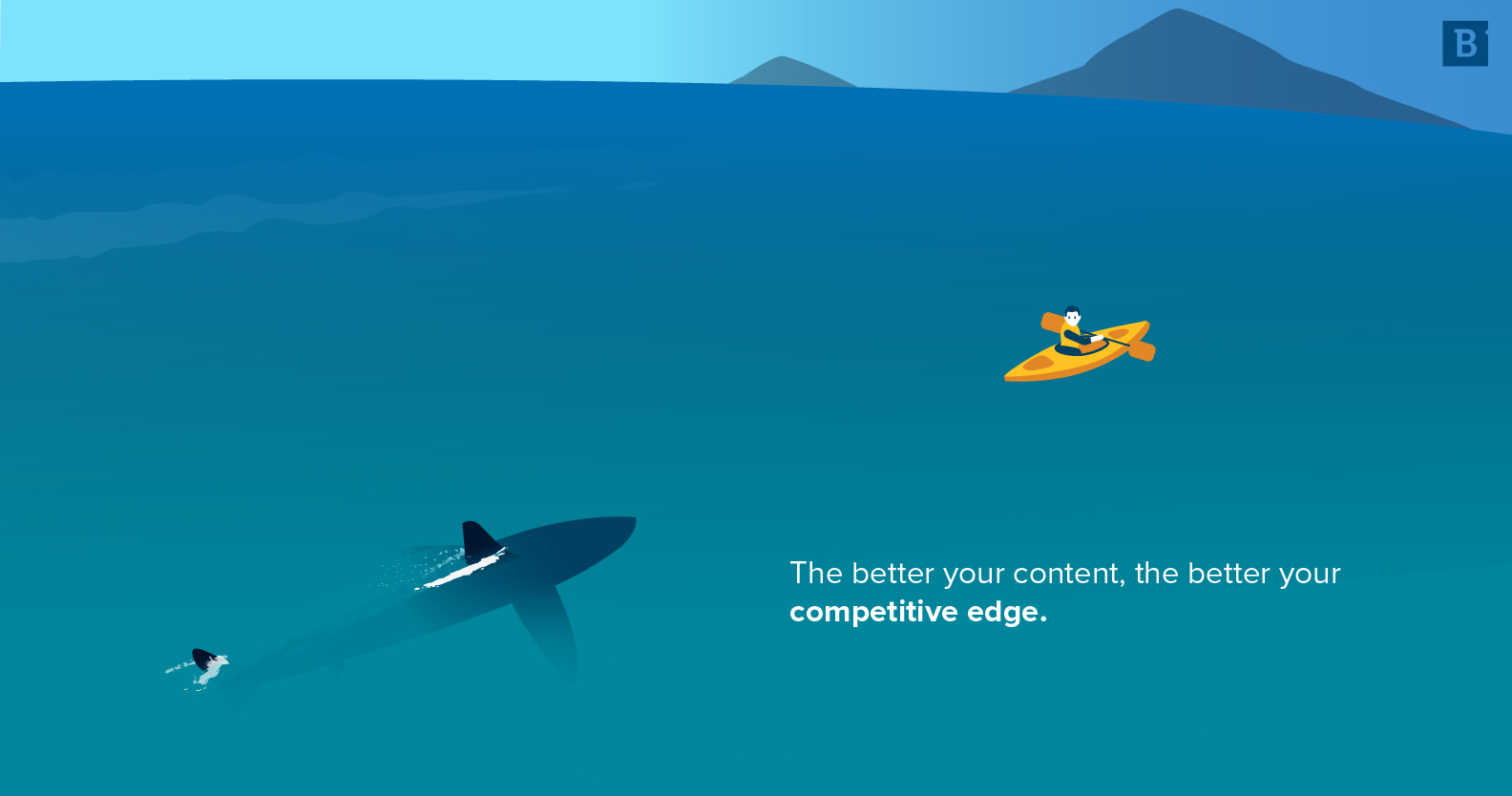Are you a Spotify or Apple Music kind of person? Walmart or Target? iPhone or Android? Both offer relatively the same products and services – yet we see them as entirely different entities. That’s the power of an effective brand differentiation strategy.
Content is a reflection of brands, meaning it only adds to the elements that distinguish them from one another. The better your content, the better your competitive edge.
Sound compelling? Let’s get down to the details of how to differentiate your brand:
What is brand differentiation?
Your mom can pick you out from the crowd in a heartbeat – maybe even with her eyes closed. Brand differentiation creates this somewhat eerie but highly potent effect on customers, making it easy for them to identify what makes a company different – and ideally better – than the alternatives.
By leveraging differentiating factors in marketing and branding efforts – maybe it’s a product or service feature, manufacturing practices or company value – brands can stand out against their competitors and attract their ideal customers.
That’s why there are two kinds of people in the world: Those who like the gimmicky, affordable and fresh nature of Trader Joe’s and others who prefer the uber-organic yet pricey options at Whole Foods. (Disclaimer: There are far more than two people in this world because we haven’t even gotten into Star Market, Kroger, Publix and farmers markets – but you get the gist.)
Does it have a right to be so high and mighty?
Technically, yes. Think about all the choices we have as consumers. Brand differentiation cuts through the clutter, presenting us with distinct winners.
It’s at the heart of the brand strategy, shaping the identity companies market to the world. Without a meaningful point of difference, brands fall flat in a sea of stronger competitors.

Making your brand stand out from the crowd
If success is linked to brand differentiation, how can you work to distinguish your brand from competitors? It’s time to look within, and truly consider what makes your brand different. While there may be several distinctive factors, it helps to home in on one or two to build a concise, dedicated identity around those ideals. If there’s too much going on, you risk confusing or boring your audience.
Choose the distinguishing factors that are most important to your brand as well as those that have the highest competitive advantage when making headway in crowded spaces. The methods to your marketing madness may include:
Your image
Clean and consistent, brand image is often the first impression customers have of companies.Think logo, website, T-shirts and all other branding materials. Brands put their distinctive spin on each element, making it easy for consumers to recognize the company at first glance. Marketers especially focus on color at this stage for obvious reasons – among them a study that found color increases brand recognition by up to 80 percent.
With image in place, you have the foundation to build a deeper identity. It’s time to get past the appearance and dive into a meaningful conversation with your audience.
Your passions
Beyond business goals, is your brand dedicated to a distinctive purpose that can also serve as a competitive advantage? You can position your brand by these passions and values that drive you to keep moving forward.
For Toms – and now many other brands – that passion is creating a practical, comfortable product for not only paying customers but also to donate to those in need. While many brands do engage in some form of charity work, this method becomes the essence of the brand’s identity.
Your business model
Oftentimes, business owners are poised to start a company after experiencing a significant brain blast that inspires a new-and-improved way of doing things. In many cases, that business model is worth sharing with potential customers.
WeWork, a trendy startup that provides shared working spaces, is a perfect example. The brand entered a relatively new industry to begin with but then made it effortlessly hip. Beyond that, WeWork is using its experiences with a myriad of workers and businesses to position itself as a thought leader with expert insight into how people get work done. This nifty business model is among the reasons why many say the brand is worth a whopping $20 billion.
Your customer experience
The material item is one thing, but the experience is a different ball game. There’s a reason why most of us prefer watching sports live from stadiums rather than staring at a screen in our living rooms sans the thrilling atmosphere. Craft brewing and distilling likely wouldn’t be half as popular if those companies didn’t also create destinations for tastings and tours. And, sometimes, a pleasant experience with an employee is all we need to choose that brand without any qualms or hesitations.
With that said, targeting consumers with a worthwhile experience and top-notch customer service can be the differentiating factor your brand can leverage to secure their loyalty.
Boosting your efforts with content
As you work out the details of your brand differentiation strategy, content can help you spread your message and uphold your brand identity. The trick to creating content that separates your brand from others in the space is keeping your audience more engaged than your competitors do, winning over their eyes, ears and eventually customer loyalty.
You’ll want to have some of these content tricks up your sleeve to augment your brand differentiation strategy:
Tell them something new
Whether it’s a blog, video or social post, share the compelling content that your audience wants to see. Answer their questions and touch on their pain points, presenting the information with your brand’s unique spin. The research stages of developing your content marketing strategy can help enlighten the topics and areas of interest that your audience is most concerned with.
Remember WeWork? The brand shares findings from their research and experiences, engaging their audience with compelling blog posts and fun social videos.
Say it in your own words
Along with what you say, differentiating your brand through content is also about how you say it. Find your distinctive voice and stick to it. It’s like a personality factor that complements your brand image, creating a seamless identity that customers will recognize as your own.
Take JetBlue, for an example, who’s recent “Get the Flight Out” Sweepstakes in Boston may have taken other audiences by surprise – but not theirs. With an established cheeky tone, the brand pulls this one off with its distinctive finesse.
The best gift on Allston Christmas? A flight far away from it. Stop by our moving truck at Rose Kennedy Greenway from 12-2 PM and Southie from 5-7 PM for your chance to win a flight outta here. https://t.co/Fqj9rXv0XW pic.twitter.com/txhdK5LMmz
— JetBlue Airways (@JetBlue) August 22, 2018
Find your niche
Is there something you know far more about than anyone else out there? If no one else is sharing a strong point of view, your brand has the potential to become the leader on this topic. Is there a gap in the current information surrounding a particular topic or industry? You can find out by visiting your competitors’ websites, signing up for their newsletters and following their social feeds. From there, you can determine what information they’re failing to share and pick up the slack with your own tailored content.
Take a stand
If your brand values are at the forefront of your differentiation strategy, don’t be afraid to share them via branded content. Rather than sitting in the safe zone, you can send a powerful message that attracts customers who agree with the stance or are sitting in no man’s land in need of reliable information to form their own opinions.
LUSH Cosmetics does this extremely well, using their blog and social content to propel their mission of creating natural, handmade products that aren’t cruel to the environment or animals. Sprinkled among best-selling lists and cosmetic tips, LUSH shares stories about exposing cruelty, biodegradable, plant-based packaging and fair trade. As such, the brand positions itself as a trusted resource for cruelty-free and environmentally friendly business practices.
They further these efforts with charity partnerships dedicated to these causes, creating special products and promoting them with social media content.
When you use these content marketing strategies to enhance your brand differentiation, customers will get to know what makes your company different from the others. Soon enough, you’ll see the number of customers who are your brand’s kind of people grow exponentially.





